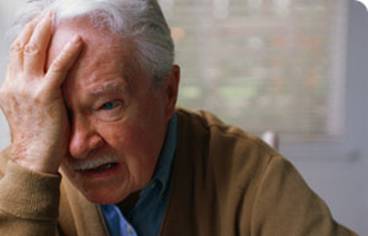|
Depression in Elderly People
By Trisha Macnair, BBC.co.uk Health
June 23, 2005

Getting older brings many advantages: wisdom, patience, contentment... But it also brings negatives, especially as our bodies become less able to do what they once did. Perhaps it's no wonder depression is common among the elderly.
It's a mistake to assume depression is an inevitable part of ageing. Depression is never normal. But despite this, many older people hide their worries and struggle alone when they feel very low. And even though effective treatments are available, elderly people are more likely to see suicide as the only way out.
If you or an elderly friend or relative has problems with bleak moods, get help from your GP as soon as possible.
The biology of depression
Older people are more likely to blame their depression on events or social circumstances. But while the death of a partner or friends, or coping with a chronic illness are all important contributory factors, there are real biological changes that account for depression.
We know from brain-imaging studies that in depression the brain circuits responsible for regulating mood, thinking, sleep, appetite and behaviour all fail to work properly. The chemicals that brain cells use to communicate with each other, called neurotransmitters, become out of balance. This happens in young and old alike and is always abnormal.
Particular patterns in the elderly
Depression has particular causes and shows certain patterns in the elderly. For example, it's much more common in the years after retirement, when people may struggle to adjust to a new role and routine in life. It's then less likely for the next decade until they're in their mid-70s, when factors such as chronic illness, frequent loss of peers and friends, and increasing restrictions on mobility may be factors.
Depression also has a different pattern of symptoms in older people compared with the young. Anxiety is particularly common, and the slowing of thought and activity.
Older people also tend to have more bodily symptoms, although it can be difficult to work out whether these are signs of depression or simply part of the increase in general illness seen with age. For example, they're more likely to battle with weakness, as well as headaches, palpitations, loss of interest in sex, abdominal or back pain, shortness of breath and constipation. Imaginary illness and hallucinations are more common too.
Similarly, deterioration in mental function can occur with depression at 18 or 88, but young people have greater mental reserves, so these problems often show up more in older people. But it's important to separate the effects of depression from those of conditions such as Alzheimer's disease.
Illness and depression
There are several conditions that can cause depression in the elderly, including heart problems, low thyroid activity (hypothyroidism), vitamin B12 or folic acid deficiency and cancer.
Many drugs also cause, aggravate or trigger depression, including beta-blockers and other blood pressure drugs, and heart drugs such as digoxin, steroids and sedatives.
Depression often occurs after a stroke, and getting it treated may be critical to restoring normal abilities.
Effective treatment
Antidepressants drugs can help to restore the balance of neurotransmitters in the brain, while social support and psychotherapy can help to deal with many of the triggers of depression. There's an excellent review of depression treatments for older adults from the US Surgeon General at
www.mentalhealth.com.
Studies have shown that over 80 per cent of people with depression improve when given the appropriate treatment with a combination of medication, psychotherapy and other measures. However, it can take longer with older people than with younger people to get a response to treatment - on average, it takes 12 weeks to achieve remission, so be patient. In elderly people in particular, the research has shown that a combination of psychotherapy and antidepressants is extremely effective in preventing depression from recurring.
Dealing with social isolation is another important part of helping to treat depression in older people. The health benefits of being part of a family or tight community are well known: living in care doubles the risk of depression, while being an active part of a church congregation lowers the risk.
Self-help remedies may be worth a try, but beware. St John's wart, for example, is increasingly self-prescribed and does help in mild to moderate depression, but it can interfere with other drug treatments, which the elderly are much more likely to be taking. Always talk to your doctor about any complementary remedies you are trying.
|



